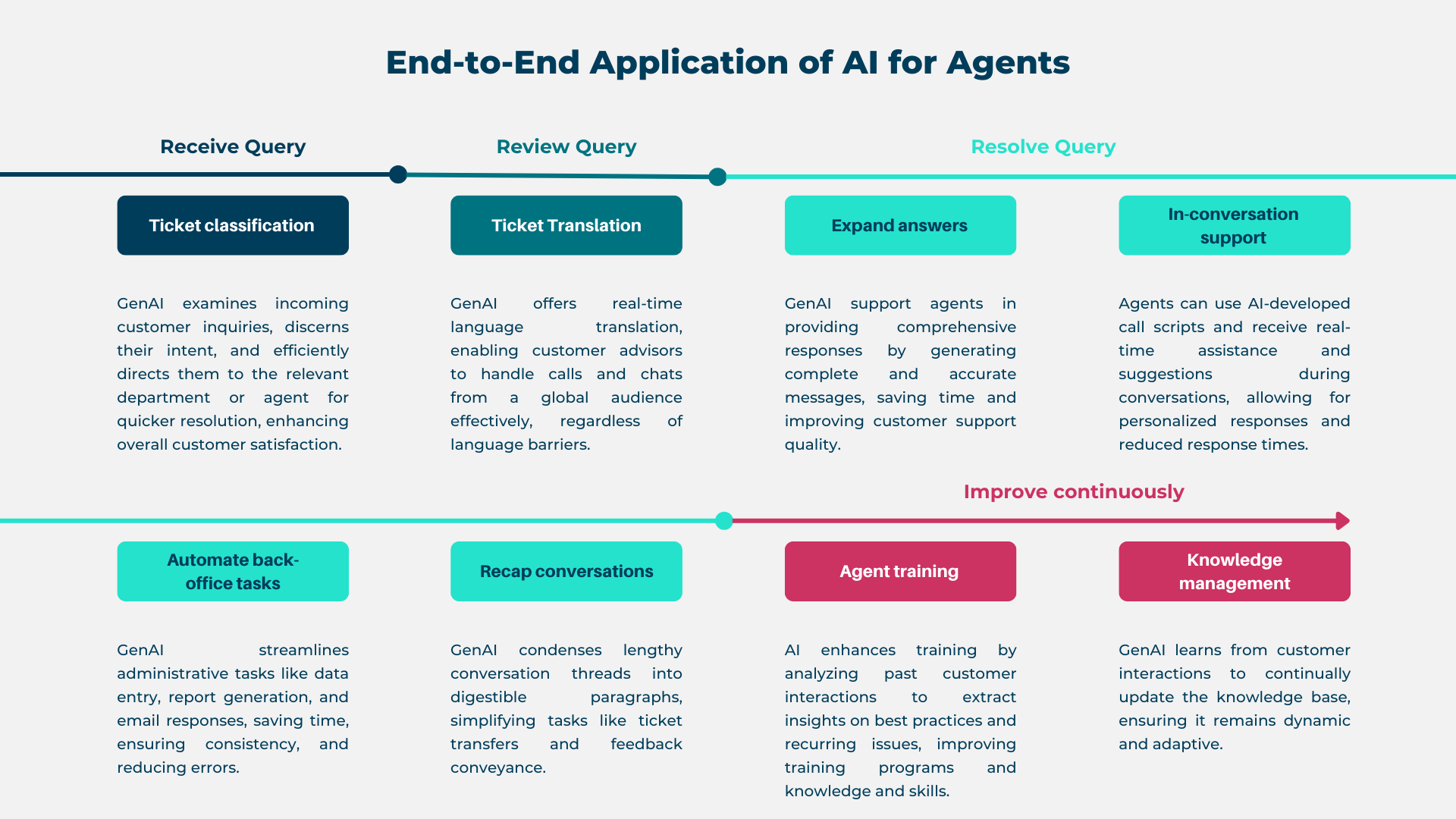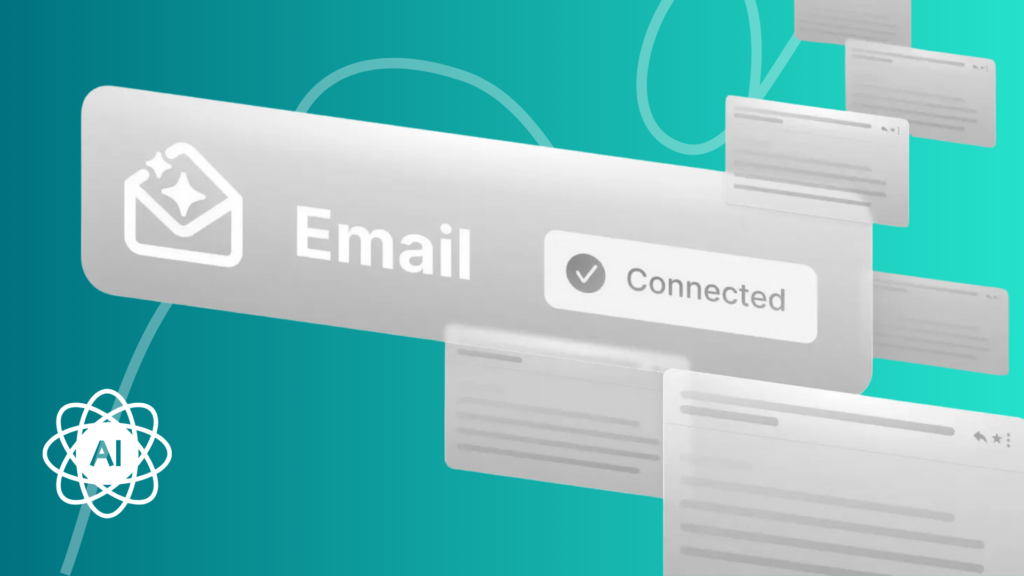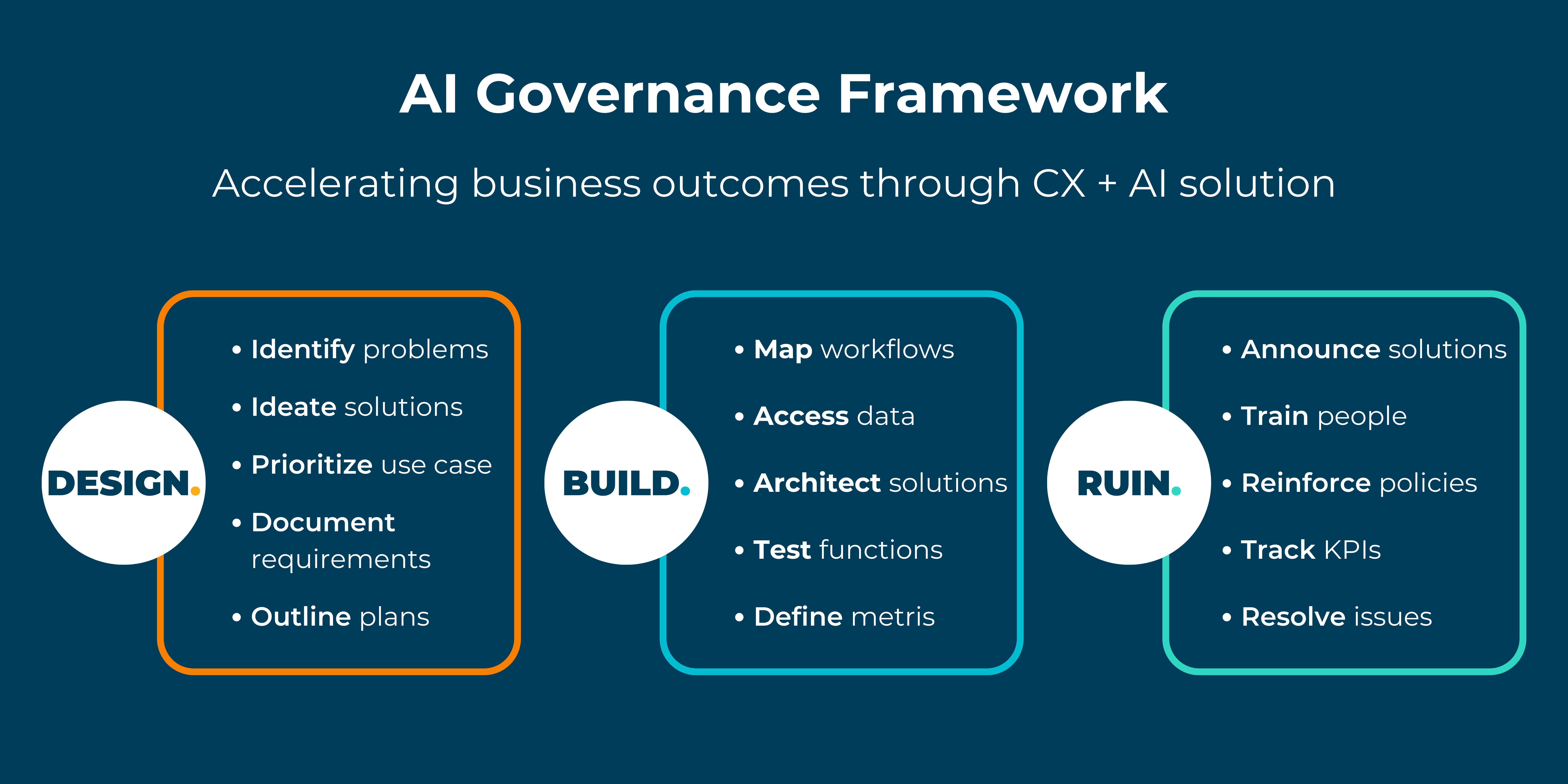Bots working with human agents is how AI in customer service looks.
In response to the evolving demands and needs of today’s customers, more companies are turning to AI as a powerful solution. This technology enables businesses to swiftly adapt to changing customer preferences, ensuring they stay ahead in an ever-shifting market landscape. GenAI’s capacity to generate personalized experiences aligns seamlessly with the dynamic expectations of modern consumers, making it an invaluable asset for companies striving to meet their customers’ evolving needs.
A recent Zendesk report reveals that 72% of customers expect immediate service, and 70% anticipate that anyone they interact with will have full context of their situation. These statistics underscore the growing demand for personalized and rapid responses, putting pressure on companies to respond effectively to avoid customer churn.
Research by the IBM Institute for Business Value indicates that CEOs now prioritize GenAI implementation in customer service above innovation, marketing, and risk compliance. This shift is driven by mounting pressure from various stakeholders, with nearly half of CEOs acknowledging the increasing demands from customers for swift and hassle-free personalized experiences.
Furthermore, 72% of business leaders agree that expanding the use of AI and bots across the customer experience is very or somewhat important over the next 12 months, according to the Zendesk CX Trends Report 2023. Additionally, 68% of business leaders already have plans to increase their investments in AI, underscoring the technology’s critical role in meeting modern customer expectations.

So… if you’re late to the AI party and are still wondering what exactly it could do to help we’re laying in some of it’s superpowers in supporting both customers AND agents.
Just a quick reminder—if you’re looking to explore AI-driven solutions for your startup or scale-up, we’re the perfect partner for you. We don’t mean to brag (or do we?), but together with Concentrix, we’ve been honored with two Business Intelligence Group AI Excellence awards. Our award-winning solutions include Concentrix Conversational Assist, which scales and enhances the overall customer experience, generates actionable insights, provides coaching, and drives operational improvements. Additionally, our TrainingAI leverages generative AI to transform how users communicate, engage with content, and learn.
So… wouldn’t you love to have an innovative partner like us by your side?
Okay let’s get back to it!
As highlighted above, AI has the potential to revolutionize customer operations, enhancing both the customer experience and agent productivity. According to McKinsey’s research, for a company with 5,000 customer service agents, the use of GenAI increased agent productivity by up to 14% and reduced handling time by 10%.
In this section, we’ll explore real-world applications of GenAI for both customers and agents
Effective chatbots excel at handling routine, low-value, and uncomplicated interactions, while also seamlessly facilitating escalation to a human agent when necessary. This allocation of tasks liberates agents to focus on intricate, high-value interactions that directly influence revenue and customer retention, thereby yielding superior results. Furthermore, chatbots should possess the capability to integrate with various business systems, such as knowledge bases, e-commerce platforms, or scheduling tools. You should adapt them to high-value communication channels, including messaging or email, spanning social platforms like WhatsApp or custom web and mobile messaging solutions.
These chatbots can be configured without the need for coding, offering out-of-the-box solutions with click-to-configure responses. However, they can also be tailored to meet specific needs by seamlessly incorporating data from various facets of your organization, culminating in a bespoke and automated customer experience.
The chatbot likely ranks as one of the most frequently encountered forms of AI-driven customer service, especially for the average customer. When deployed effectively, chatbots don’t supplant human support; instead, they serve as a protective shield for agents. Chatbots possess the capability to respond to common inquiries using predefined answers or by scanning existing resources such as manuals, web pages, or previous interactions.
Sometimes, the best way to help people is to help them help themselves.
Unlike conversational AI bots, Self-service bots do not require predefined scripts and responses. They have the power to understand user inputs, process context, and develop recommend actions, drawing insights from a customer’s browsing patterns and prevalent recent inquiries spanning the website. By identifying or even predicting potential obstacles before customers seek support, self-service bots can proactively intervene. For instance, if there’s a surge in clicks or in-site search queries related to a specific product category or content area, it can proactively offer relevant pages to expedite visitors’ navigation to their likely destinations. Additionally, this presents an opportunity for businesses to suggest tailored products or services to well-qualified leads.
Overall self-service bots can improve CSAT score through meaningful and satisfying interactions.
Leveraging generative AI as a research tool to gather and dissect sentiment-based metrics for each customer service interaction is a transformative approach in the realm of customer support analysis. By harnessing the power of AI-driven sentiment analysis, you can gain profound insights into customer emotions, preferences, and satisfaction levels in real-time. This technology enables the automatic identification of positive or negative sentiment within conversations, helping your organization pinpoint areas of concern or opportunities for improvement.
The ability to collect and analyze sentiment metrics at scale not only enhances the understanding of customer experiences but also empowers businesses to make data-driven decisions aimed at optimizing customer service, fostering greater loyalty, and ultimately driving growth.

Generative AI revolutionizes customer support and product recommendations by harnessing its capacity to understand and analyze vast datasets of customer behavior and preferences. Through advanced algorithms and machine learning, GenAI can craft highly personalized interactions with customers. It tailors product recommendations based on individual preferences, purchase history, and browsing behavior, ensuring that each customer receives suggestions that resonate with their unique tastes and needs. This level of personalization not only enhances the customer experience but also drives engagement and boosts conversion rates, ultimately fostering customer loyalty and satisfaction. GenAI’s ability to deliver timely, relevant, and individualized support and recommendations empowers businesses to forge deeper connections with their customers, leading to improved retention and increased sales.
GenAI offers a transformative solution in developing interactive tutorials for customer support. With its capabilities, GenAI can craft engaging and user-friendly tutorials and walkthroughs that guide customers through the process of using products or services effectively. These interactive guides serve as a powerful tool for reducing the influx of support tickets, as customers can independently address their queries and issues. Moreover, they enhance product usage and adoption by providing customers with a seamless and intuitive learning experience. As a result, customer satisfaction soars, solidifying the relationship between businesses and their clients while streamlining support operations for more efficient and effective customer service.

Examine incoming customer inquiries, discern their underlying intent, and efficiently direct them to the relevant department or agent for resolution. This approach is instrumental in enhancing response times and, consequently, elevating overall customer satisfaction.
AI-powered support ticket organization, utilizing technologies like Natural Language Processing (NLP) and sentiment analysis, employs predefined rules to autonomously categorize and label tickets, directing them to the appropriate agent and support stage. The integration of AI into the ticketing process yields two significant advantages over manual methods: it reduces the time agents spend on repetitive and low-impact tasks, while also providing businesses with the scalability needed to expand their support operations as they grow.
Moreover, AI continually refines its strategies through self-learning, leveraging analytics to adapt and optimize its processes over time. As resolution methods evolve, AI-driven ticketing systems can dynamically adjust how they categorize and tag conversations, ensuring the efficient assignment of tickets and keeping agents well-informed and engaged in addressing customer issues.
Language translation is a transformative capability offered by Generative AI. It enables customer advisors to seamlessly handle calls and chats from a global audience, regardless of the language spoken, with real-time translation. As Generative AI models become more proficient in multiple languages through training and refinement, the quality and accessibility of translation services will see continuous enhancements, ensuring efficient and effective communication across linguistic barriers.
It may not be feasible for every seller to have support agents covering major languages in the world, but it is feasible to employ AI translation tools to support them.
Such tools possess the capability to autonomously identify the language of incoming messages and subsequently translate them for the benefit of both the customer and the agent. Furthermore, when coupled with advanced neural machine translation (NMT) services, these tools can go a step further by recognizing the customer’s geographical location and adjusting the language and phrasing to align with local linguistic and cultural intricacies. In certain instances, they even provide speech-to-speech translation for a more comprehensive communication experience.
GenAI serves as a valuable ally to support agents by expanding their ability to provide comprehensive responses efficiently. With AI-generated chat answers, support representatives can streamline their communication by crafting shorthand customer responses, leaving the intricate task of generating complete and well-phrased messages to artificial intelligence. This collaborative approach not only saves time but also ensures that customers receive thorough and accurate answers. GenAI can suggest or rephrase responses to align with customer queries, reducing the margin for errors and enhancing the overall quality of customer support interactions. As a result, support agents can focus on addressing complex issues and delivering a more personalized service, while GenAI handles the intricacies of message formulation, ultimately leading to improved customer satisfaction and operational efficiency.

Agents can leverage AI-developed call scripts and receive real-time assistance and suggestions for responses during phone conversations or chats allowing them to simultaneously access customer data to tailor responses, to reduce response time, and to maintain a consistent brand tone of voice across all conversations.
GenAI streamlines back-office tasks for support agents by automating data entry, report generation, documentation, and email responses. It extracts and populates data from various sources, creates standardized reports, generates documents, drafts email responses, and even assists with content creation. This automation not only saves agents significant time and effort but also ensures consistency and reduces the risk of errors in administrative processes. Additionally, GenAI can analyze data, summarize information, and assist in appointment scheduling, empowering agents to focus on more complex customer inquiries and providing more efficient and accurate support.
Whether you’re handling tasks like ticket transfers, filling in for a colleague, or conveying feedback and feature requests to product teams, AI-powered summarization streamlines the process by condensing lengthy conversation threads into concise and easily digestible paragraphs. This automation feature of generative AI in customer support significantly decreases manual workload. In line with the findings of Intercom’s State of AI 2023 report, 28% of respondents have reported that artificial intelligence aids them in summarizing conversations.
GenAI proves instrumental in coaching and training efforts by leveraging its ability to analyze past customer interactions. By scrutinizing these interactions, GenAI extracts invaluable insights regarding best practices and identifies recurring issues within customer support. These insights serve as a foundation for enhancing coaching and training programs, equipping support agents with the knowledge and skills needed to excel in their roles. As a result, the overall quality of customer support improves significantly. Agents are better prepared to handle a diverse array of customer inquiries and challenges, ultimately leading to heightened customer satisfaction and loyalty. Consequently, this significantly reduces supervisor’s workload.
GenAI learns from customers’ interactions and incorporates newfound insights into the knowledge base, ensuring that it remains dynamic and adaptive. This enrichment process enhances the depth and breadth of support materials, enabling agents and customers to access comprehensive and up-to-date information. GenAI’s ability to build upon what it has learned facilitates a knowledge base that evolves in real-time, keeping pace with changing customer needs and emerging issues.
The implementation of AI also comes with its own set of challenges and risks. Companies must navigate issues such as data privacy concerns, the potential for biased algorithms, and the need for continuous system updates and maintenance. Ensuring transparency and building trust with customers is crucial, as is providing adequate training for agents to effectively use AI tools. Strategic planning and a robust framework for monitoring and evaluation are essential to mitigate these risks and fully leverage the benefits of AI.
Now, let’s delve into the challenges, risks, and recommendations associated with the implementation of GenAI.
There’s a risk that AI systems generate false information to customers. This could lead to customer confusion, frustration, and eroded trust in AI-driven customer service solutions. It underscores the importance of implementing robust security measures and content validation procedures to ensure that AI systems provide accurate and reliable information to customers while mitigating the risk of misinformation. Additionally, educating customers about the capabilities and limitations of AI in customer service can help them make informed decisions and minimize the impact of potential misinformation.
Have you heard the story about a certain airline chatbot that got a bit creative with their refund policy and had to honor it? Read more here!
Quality control for outputs generated by generative AI models presents a substantial challenge due to their inherent unpredictability. While one result from a GPT model may align perfectly with your brand’s guidelines, the next one may deviate significantly. For instance, an advertisement created by the model might be well-suited for one cultural context but highly offensive in another. Unlike humans who can swiftly discern such nuances, the AI lacks cultural awareness and may inadvertently produce inappropriate content. Consequently, human review remains a crucial step in evaluating the quality of AI-generated output.
Another noteworthy limitation of generative AI models is their potential to generate fictional or erroneous “facts”. These instances, often referred to as “hallucinations,” can range from benign inaccuracies, such as misattributing the invention of the cotton gin, to potentially legally actionable false claims, such as fabricating criminal accusations. In enterprise applications, where accuracy is paramount, the risk of AI models generating such hallucinations underscores the necessity for robust safeguards and guidelines before their deployment, particularly in cases where reliable information is essential, such as search functions.
Generative AI introduces potentially substantial legal and regulatory challenges, as exemplified by instances where these tools have incorporated copyrighted material without proper authorization from creators. Furthermore, the terms of service for generative AI applications often lack clarity regarding the utilization of user interaction data for model improvement, which can give rise to privacy and security apprehensions, as evidenced by past incidents involving the exposure of corporate source code.
Moreover, the opacity surrounding the training data employed in generative AI models can have regulatory repercussions, as illustrated by Italy’s temporary suspension of ChatGPT back in 2023. This suspension was prompted by concerns related to issues like consent, privacy, output accuracy, and age verification, underlining the importance of addressing these issues to ensure compliance with evolving regulations.

Generative AI poses a significant danger when it comes to the protection of sensitive data. While these advanced algorithms have the remarkable ability to create human-like text, images, and even videos, they can also be harnessed for malicious purposes. Improperly controlled or maliciously designed generative models can be used to generate convincing fake content that can deceive individuals and automated systems.
To mitigate this risk, it is crucial to prioritize robust security measures at every stage of data handling, from collection and storage to usage and sharing. Implementing encryption, access controls, and regular security audits are essential steps to safeguard sensitive data and ensure that generative AI technology is used responsibly and ethically. Failure to do so could lead to severe consequences, including privacy breaches, misinformation campaigns, and potential harm to individuals and organizations.
Ensuring that inputs and outputs align with ethical standards is a critical aspect of harnessing generative AI while protecting sensitive data. It’s essential to mitigate bias, adhere to legal and ethical obligations, and promote fairness in AI-generated content. By carefully curating training data, regularly auditing model outputs, and implementing bias-reduction techniques, we can minimize the potential for discriminatory or harmful content.
Additionally, incorporating transparency and accountability into the development and deployment of generative AI systems helps maintain public trust and ensures responsible usage. In an age where technology plays an ever-increasing role in our lives, aligning AI with ethical standards is paramount to fostering a safe and equitable digital environment.
Generative AI, while a powerful tool, still faces limitations in replacing human interactions primarily due to the potential loss in the quality of these interactions. While AI systems can generate text, images, and even mimic human-like responses, they often lack the depth of understanding, empathy, and nuanced decision-making abilities that humans possess. Here’s why:
Lack of Empathy: AI lacks genuine emotions and empathy. It cannot fully understand or empathize with the emotions, needs, or concerns of individuals, which are often crucial in various human interactions, especially in customer service or support.
Limited Contextual Understanding: Generative AI may struggle with grasping the full context of a conversation or situation. It can misinterpret queries, leading to inaccurate or inappropriate responses, potentially frustrating users.
Inflexibility: AI follows predefined algorithms and patterns, making it less adaptable to unexpected or novel situations. Humans can adapt to various scenarios, providing creative solutions and improvisation when necessary.
Complex Decision-Making: Many interactions involve complex decision-making processes that require a deep understanding of ethics, morals, and situational nuances. AI lacks the moral and ethical reasoning capabilities of humans.
Trust and Reliability: Human interactions often hinge on trust and credibility. People are more likely to trust and have confidence in information or support provided by humans rather than AI, which may be seen as less reliable.
While generative AI can be a valuable tool for automating routine tasks and providing information quickly, it cannot fully replace humans in interactions where emotional intelligence, empathy, creativity, and ethical judgment are essential. Therefore it is crucial to understand that Gen AI will not be replacing the human interaction, but simply empower
Implementing AI on a large scale isn’t simply a matter of flipping a switch; it requires a well-thought-out plan, an integrated ecosystem, and robust governance. However, with the right framework, successful AI implementation and risk mitigation are achievable.
Each company must determine the best use of AI technology to achieve their business goals, balancing the opportunities and risks involved. We anticipate significant improvements in quality, speed, and cost-effectiveness for most digital services and solutions.
Traditional customer experience self-service and digital channels will experience the most impact, with AI serving as a content auditor, writer, editor, and moderator across platforms like search engines, websites, apps, emails, documents, chats, surveys, dashboards, and media. In human-assisted channels, AI will help advisors become better communicators, faster problem solvers, and more effective overall, thus adding value to both customers and the business.
On the risk side, businesses face new challenges in various areas. Strategies should consider risk tolerance and benefits regarding legal and regional issues, evolving to include use cases where AI and human services are combined. The inherent limitations of new AI models can pose challenges for organizations implementing new services. For example, generative AI still carries risks around accuracy (e.g., producing incorrect responses), necessitating that businesses review all AI outputs to avoid dissatisfaction or compliance issues. Misunderstanding AI’s capabilities may lead end-users to seek help for features not yet deployed. Above all, organizations must ensure the security of customer data is robust and impenetrable.
To successfully navigate the complexities of AI implementation, it’s essential to establish an AI Governance Framework. This framework acts as a roadmap for identifying opportunities and addressing risks that affect both businesses and their customers. The process begins with understanding the regulations surrounding AI usage, including legal, compliance, privacy, security, accessibility, and sustainability considerations, all managed through effective governance.
AI governance is the cornerstone of responsible and ethical AI deployment. It involves developing a comprehensive framework that includes principles, guidelines, technology controls, and regulations addressing issues such as fairness, accountability, transparency, and privacy. By implementing AI governance, organizations can create a more trustworthy and inclusive customer experience, fostering customer loyalty and enhancing brand reputation.
Our AI Governance Framework is designed to help companies implement AI in their operations efficiently and securely while ensuring compliance with regulations and protecting customer data. This framework provides a comprehensive approach to navigating the complexities of AI integration, offering guidance on best practices to maximize efficiency and effectiveness.
With our framework, organizations can confidently adopt AI technologies, knowing they are safeguarding customer information and adhering to all legal and regulatory requirements. Let us help you leverage AI to its fullest potential in a secure and compliant manner.

While the urge to quickly introduce generative AI into customer interactions is strong, it’s important to remember that GenAI is not yet flawless and can potentially harm a brand, affecting its security and image. GenAI has vast potential, but finding the right balance between human interaction and intelligent automation is crucial.
AI is more than just a trend; it’s a transformative tool that can revolutionize your business operations! Discover how we can assist you in taking the initial steps toward successful AI implementation. Reach out to us for a comprehensive assessment to understand your unique needs, challenges, and goals. We’ll then develop a tailored solution that perfectly fits your business requirements. Trust our expertise—many other startups and scale-ups have successfully navigated this process with our support!
Your future success hinges on it.
Unlock Tech-Powered Performance with Our End-to-End Capabilities! Harness data, advanced technology, and operational excellence to transform your entire startup or scale-up, from front to back.
